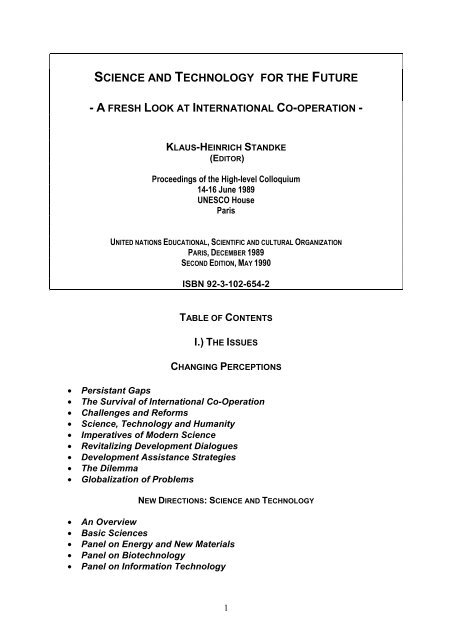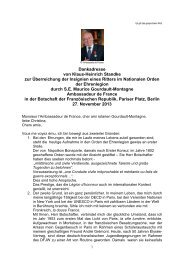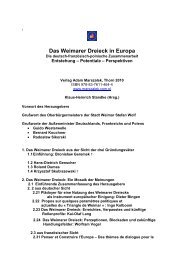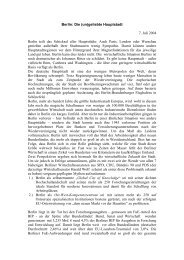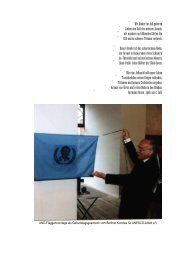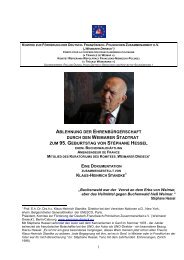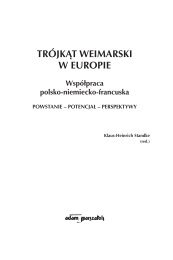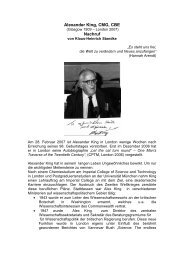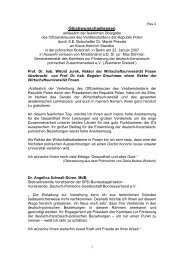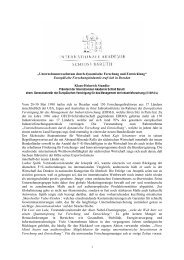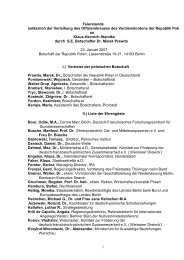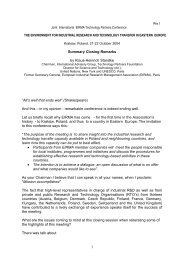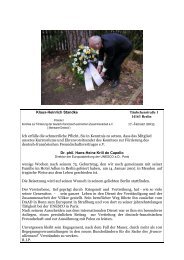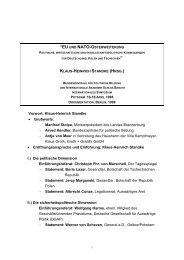Science and Technology for the Future,Contents, Preface ...
Science and Technology for the Future,Contents, Preface ...
Science and Technology for the Future,Contents, Preface ...
Create successful ePaper yourself
Turn your PDF publications into a flip-book with our unique Google optimized e-Paper software.
SCIENCE AND TECHNOLOGY FOR THE FUTURE<br />
- A FRESH LOOK AT INTERNATIONAL CO-OPERATION -<br />
KLAUS-HEINRICH STANDKE<br />
(EDITOR)<br />
Proceedings of <strong>the</strong> High-level Colloquium<br />
14-16 June 1989<br />
UNESCO House<br />
Paris<br />
UNITED NATIONS EDUCATIONAL, SCIENTIFIC AND CULTURAL ORGANIZATION<br />
PARIS, DECEMBER 1989<br />
SECOND EDITION, MAY 1990<br />
ISBN 92-3-102-654-2<br />
TABLE OF CONTENTS<br />
I.) THE ISSUES<br />
CHANGING PERCEPTIONS<br />
• Persistant Gaps<br />
• The Survival of International Co-Operation<br />
• Challenges <strong>and</strong> Re<strong>for</strong>ms<br />
• <strong>Science</strong>, <strong>Technology</strong> <strong>and</strong> Humanity<br />
• Imperatives of Modern <strong>Science</strong><br />
• Revitalizing Development Dialogues<br />
• Development Assistance Strategies<br />
• The Dilemma<br />
• Globalization of Problems<br />
NEW DIRECTIONS: SCIENCE AND TECHNOLOGY<br />
• An Overview<br />
• Basic <strong>Science</strong>s<br />
• Panel on Energy <strong>and</strong> New Materials<br />
• Panel on Biotechnology<br />
• Panel on In<strong>for</strong>mation <strong>Technology</strong><br />
1
NEW CONCERNS: ENVIRONMENT<br />
• An Overview<br />
• The Oceans <strong>and</strong> Coastal Systems<br />
• Panel on Terrestrial Ecosystems<br />
• Panel on Earth <strong>and</strong> Water <strong>Science</strong>s<br />
NEW SOCIO-ECONOMIC CONTEXT<br />
• An Overview<br />
• Strategic Planning Considerations<br />
CURRENT AND FUTURE STRATEGIES<br />
• An Overview<br />
• Human Resources Development<br />
• Funding <strong>Science</strong> <strong>and</strong> <strong>Technology</strong><br />
• New Mechanisms <strong>for</strong> Co-operation<br />
• International Co-operation in scientific research<br />
• International Co-operation in Technological Research<br />
CONCLUSION<br />
II.) THE ACTORS AND THEIR TOPICS<br />
<strong>Preface</strong>:<br />
Introduction:<br />
Federico Mayor, Director-General, UNESCO<br />
Klaus-Heinrich St<strong>and</strong>ke<br />
Federico Mayor Director-General, UNESCO<br />
Persistant Gaps<br />
Frank Press President, National Academy of <strong>Science</strong>s, USA<br />
The Survival of International Co-Operation<br />
G. I. Martchuk President, USSR Academy of <strong>Science</strong>s<br />
Challenges <strong>and</strong> Re<strong>for</strong>ms<br />
M.G.K. Menon President, International Council of Scientific Unions (ICSU),<br />
<strong>Science</strong> Adviser to The Prime Minister of India<br />
<strong>Science</strong>, <strong>Technology</strong> <strong>and</strong> Humanity<br />
J. Auboin President, French Academy of <strong>Science</strong>s<br />
Imperatives of Modern <strong>Science</strong><br />
S. G. Trindade Assistant Secretary-General, Executive Director,<br />
Centre <strong>for</strong> <strong>Science</strong> <strong>and</strong> <strong>Technology</strong> <strong>for</strong> Development,<br />
United Nations<br />
Revitalizing Development Dialogues<br />
J. C. Wheeler Chairman, Development Assistance Committee, OECD<br />
Development Assistance Strategies<br />
C. Lafer Chairman, United Nations Intergovernmental Committee on<br />
2
<strong>Science</strong> <strong>and</strong> <strong>Technology</strong> <strong>for</strong> Development<br />
The Dilemma<br />
H. Curien Minister of Research <strong>and</strong> Development, France<br />
Globalization of Problems<br />
NEW DIRECTIONS: SCIENCE AND TECHNOLOGY<br />
PANEL ON BASIC SCIENCES<br />
An Overview:<br />
R. Sagdeev President, Committee of Soviet Scientists,<br />
Director, Space Research Institute, USSR Academy of<br />
<strong>Science</strong>s, Member of Soviet Parliament<br />
Chairman (Introduction <strong>and</strong> Summary):<br />
W. Gordon Foreign Secretary, US National Academy of <strong>Science</strong>s,<br />
Vice-President of ICSU<br />
Opinions:<br />
S. Bergström President, Nobel Committee, Sweden,<br />
Nobel Prize in Medicine 1980<br />
H. Hogbé-Nlend Cameroon,<br />
University of Bordeaux<br />
C. Ponnamperuma Director<br />
Institute of Fundamental Studies, Sri Lanka<br />
A. Shibab-Eldin Director-General, Kuwait Institute <strong>for</strong> Scientific Research<br />
PANEL ON ENERGY AND NEW MATERIALS<br />
Chairman (Introduction <strong>and</strong> Summary):<br />
H. Czichos President, Bundesanstalt für Material<strong>for</strong>schung<br />
Opinions:<br />
V. Farinelli Scientific Counsellor, ENEA, Italy<br />
O. Novick Managing Director, Econergics, Israel<br />
M. Rodot Director, CNRS, Laboratory of Solid Physics<br />
PANEL ON BIOTECHNOLOGY<br />
Chairman (Introduction <strong>and</strong> Summary):<br />
F. Gros Collège de France, Member of <strong>the</strong> Institute<br />
Opinions:<br />
A. Araoz Deputy Director-General, UNIDO<br />
E. Edroma Chairman, Executive Committee, African Bioscience Network,<br />
Kampala<br />
C.G. Heden President, World Academy of <strong>Science</strong>s<br />
3
PANEL ON INFORMATION TECHNOLOGY<br />
Chairman (Introduction <strong>and</strong> Summary):<br />
A. Danzin Chairman, Intergovernmental In<strong>for</strong>matics Programme<br />
(UNESCO), Vice-President, French Commission <strong>for</strong> UNESCO<br />
Opinions:<br />
A.M. Abdel-Bassit Director, National Scientific <strong>and</strong> Technical In<strong>for</strong>mation Network,<br />
Academy of Scientific Research <strong>and</strong> <strong>Technology</strong>, Cairo<br />
T.E.Frisk President, EuroPACE, <strong>for</strong>mer Vice-President, <strong>Science</strong> <strong>and</strong><br />
<strong>Technology</strong>, IBM Europe<br />
B. Sendov President, Bulgarian Academy of <strong>Science</strong>s,<br />
Member, Executive Board of ICSU<br />
NEW CONCERNS: ENVIRONMENT<br />
AN OVERVIEW:<br />
M.S.Swaminathan President, International Union <strong>for</strong>t <strong>the</strong> Conservation of Nature<br />
PANEL ON THE OCEANS AND COASTAL SYSTEMS<br />
Chairman (Introduction <strong>and</strong> Summary):<br />
U. Lie Chairman, Intergovernmental Oceanographic Commission<br />
Director, Institute of Marine Biology, Blomsterdalen, Norway<br />
Opinions:<br />
B.R.Doos Deputy Director, Institute <strong>for</strong> Applied Systems Analysis, Vienna<br />
K.F.Hasselmann Director, Max-Planck-Institut für Meteorologie, Hamburg<br />
G. Hempel Director, Aölfred Wegener-Institut für Meeres<strong>for</strong>schung, Kiel<br />
R.W. Stewart Deputy Minister <strong>for</strong> <strong>Science</strong>, Victoria, B.C., Canada<br />
F. Talbot Director, National Museum of Natural History, Smithsonian<br />
Institution, Washington, D.C.<br />
M. Vanucci Coordinator, UNESCO Asian Mangrove Project, New Delhi<br />
PANEL ON TERRESTRIAL ECOSYSTEMS<br />
Chairman (Introduction <strong>and</strong> Summary):<br />
W. Li President, Intergovernmental Council of <strong>the</strong> Man <strong>and</strong> <strong>the</strong><br />
Biosphere Programme (UNESCO),<br />
Member of <strong>the</strong> Chinese Academy of <strong>Science</strong>s<br />
Opinions:<br />
F. di Castri Director of Research, CNRS, Montpellier<br />
S. Evteev Assistant Executive Director, UNEP<br />
B. Long Director of Environment, OECD<br />
E.von Weizsäcker Director, Institute <strong>for</strong> European Environmental Policy, Bonn<br />
4
PANEL ON EARTH AND WATER SCIENCES<br />
L.J.Mostermann<br />
Chairman (Introduction <strong>and</strong> Summary):<br />
Honorary Fellow, International Institute <strong>for</strong> Hydraulic <strong>and</strong><br />
Environmental Engineering, Delft<br />
Former Chairman, United Nations Committee on <strong>Science</strong> <strong>and</strong><br />
<strong>Technology</strong> <strong>for</strong> Development<br />
Opinions:<br />
T. Chambolle Director of Research <strong>and</strong> Technological Developments, Société<br />
Lyonnaise des Eaux, France<br />
G. Young Chairman, Intergovernemental Council of <strong>the</strong> International<br />
Hydrological Programme (UNESCO),<br />
Director, Cold Regions Research Centre, Wilfried Laurier<br />
University, Waterloo, Ontario, Canada<br />
A.J. Naldrett Chairman of <strong>the</strong> Board, International Geological Correlation<br />
Programme, University of Toronto, Canada<br />
NEW SOCIO-ECONOMIC CONTEXT<br />
AN OVERVIEW:<br />
A. King President, Club of Rome<br />
J. Ripert Former Director-General <strong>for</strong> Development <strong>and</strong> International<br />
Economic Co-operation, United Nations<br />
Chairman (Introduction <strong>and</strong> Summary):<br />
A. King President, Club of Rome<br />
Opinions:<br />
Strategic Planning Considerations<br />
F. Sagasti Chief, Strategic Planning Division, The World Bank, Washington,<br />
Chairman, United Nations Advisory Committee <strong>for</strong> <strong>the</strong><br />
Application of <strong>Science</strong> <strong>and</strong> <strong>Technology</strong> to Development<br />
CURRENT AND FUTURE STRATEGIES<br />
AN OVERVIEW<br />
W. Rosenblith Former Foreign Secretary, US National Academy of <strong>Science</strong>s,<br />
Convenor, ICSU Conference on International <strong>Science</strong> <strong>and</strong> its<br />
Partners<br />
PANEL ON HUMAN RESOURCES DEVELOPMENT<br />
Chairman (Introduction <strong>and</strong> Summary):<br />
O. Odhiambo Director, The International Centre of Insect Physiology <strong>and</strong><br />
Ecology, Nairobi,<br />
5
President, African Academy of <strong>Science</strong>s<br />
Opinions:<br />
J. Boright Director, Division of International Programmes,<br />
US National <strong>Science</strong> Foundation<br />
J. R. Gass Director, Education, Manpower <strong>and</strong> Social Affairs, OECD<br />
J.C. McKenzie Secretary, Institute of British Civil Engineers,<br />
Secretary-General, World Federation of Engineering<br />
Organizations<br />
J. Tear Director, International Foundation <strong>for</strong> <strong>Science</strong><br />
PANEL ON FUNDING SCIENCE AND TECHNOLOGY<br />
Chairman (Introduction <strong>and</strong> Summary):<br />
R. Lalkaka Director, United Nations Fund <strong>for</strong> <strong>Science</strong> <strong>and</strong> <strong>Technology</strong> <strong>for</strong><br />
Development<br />
PANEL ON INTERNATIONAL CO-OPERATION IN SCIENTIFIC RESEARCH:<br />
NEW MECHANISMS FOR CO-OPERATION<br />
Chairman (Introduction <strong>and</strong> Summary):<br />
A. Salam Director, International Centre <strong>for</strong> Theoretical Physics, Trieste,<br />
President, Third World Academy of <strong>Science</strong>s,<br />
Nobel Prize in Physics 1979<br />
PANEL ON INTERNATIONAL CO-OPERATION IN TECHNOLOGICAL RESEARCH:<br />
NEW MECHANISMS FOR CO-OPERATION<br />
Chairman (Introduction <strong>and</strong> Summary):<br />
R. Lesgards President, City of <strong>Science</strong>s <strong>and</strong> Industry, Paris<br />
Opinions:<br />
M. Macioti Principal Counsellor, <strong>Science</strong>, Research <strong>and</strong> Development,<br />
Commission of <strong>the</strong> European Communities<br />
J.P.Massué Scientific Counsellor, Parliamentary Assembly, Council of Europe<br />
R. Sagdeev President, Committee of Soviet Scientists,<br />
Director, Space Research Institute, USSR Academy of<br />
<strong>Science</strong>s, Member of Soviet Parliament<br />
S. Okamura Tokyo Denkin University<br />
President, Japan Society <strong>for</strong> <strong>the</strong> Promotion of <strong>Science</strong>,<br />
Chairman, Natural <strong>Science</strong> Section, Japanese National<br />
Commission <strong>for</strong> UNESCO<br />
****************************************<br />
CONCLUSION:<br />
KLAUS-HEINRICH STANDKE<br />
6
PREFACE<br />
BY FEDERICO MAYOR<br />
DIRECTOR-GENERAL OF UNESCO<br />
From 14-16 June 1989 Unesco organized a colloquium at its Headquarters in Paris<br />
on <strong>the</strong> Theme “<strong>Science</strong> <strong>and</strong> <strong>Technology</strong> <strong>for</strong> <strong>the</strong> <strong>Future</strong>: A Fresh Look at International<br />
Co-operation”. This colloquium contributed to <strong>the</strong> end-of-decade review of <strong>the</strong> Vienna<br />
Programme of Action on <strong>Science</strong> <strong>and</strong> <strong>Technology</strong> <strong>for</strong> Development undertaken by<br />
<strong>the</strong> United Nations <strong>for</strong> <strong>the</strong> period 1979-1989.<br />
The primary aim of <strong>the</strong> event was to seek a better underst<strong>and</strong>ing of <strong>the</strong> objectives,<br />
achievements <strong>and</strong> failures of intergovernmental co-operation in science <strong>and</strong><br />
technology. The colloquium was attended by eighty-four distinguished individuals <strong>and</strong><br />
representatives of organizations within <strong>and</strong> outside <strong>the</strong> United Nations system: They<br />
included outst<strong>and</strong>ing experts in specialised fields of science <strong>and</strong> technology from<br />
major intergovernmental organizations, presidents of national <strong>and</strong> regional<br />
academies of science <strong>and</strong> presidents <strong>and</strong>/or secretaries-general of <strong>the</strong> main science<br />
<strong>and</strong> technology international non-governmental organizations.<br />
The colloquium provided a <strong>for</strong>um <strong>for</strong> debate on <strong>the</strong> pervasive role of science <strong>and</strong><br />
technology over a broad spectrum of human endeavour <strong>and</strong> <strong>the</strong> implications of<br />
emerging socio-economic <strong>and</strong> technological trends <strong>for</strong> international of <strong>the</strong> science<br />
<strong>and</strong> technology co-operation in <strong>the</strong> coming decade.<br />
As well as presenting <strong>the</strong> views expressed at <strong>the</strong> colloquium, <strong>the</strong> brochure highlights<br />
<strong>the</strong> salient issues raised <strong>and</strong> <strong>the</strong> trends identified. To all those who contributed to this<br />
stimulating endeavour, I extend Unesco’s most warm thanks.<br />
“PERSISTENT GAPS”<br />
OPENING STATEMENT BY<br />
FEDERICO MAYOR<br />
DIRECTOR-GENERAL OF UNESCO<br />
The United Nations <strong>and</strong> its Specialized Agencies have come a long way since <strong>the</strong><br />
first United Nations Conference on <strong>Science</strong> <strong>and</strong> <strong>Technology</strong> <strong>for</strong> <strong>the</strong> benefit of <strong>the</strong><br />
least developed areas, which took place in 1963 in Geneva under <strong>the</strong> chairmanship<br />
of Professor Thacker of India, <strong>and</strong> with Professor Chagas of Brazil serving as<br />
Secretary-General.<br />
Sixteen years later, two o<strong>the</strong>r distinguished representatives of <strong>the</strong>se countries were<br />
to play a prominent role at <strong>the</strong> second United Nations Conference on <strong>Science</strong> <strong>and</strong><br />
<strong>Technology</strong> <strong>for</strong> Development in Vienna in 1979. I am talking, of course, of Professor<br />
Menon of India, Chairman of <strong>the</strong> Conference Preparatory Committee <strong>and</strong> Vice-<br />
Chairman of <strong>the</strong> Conference, present here at this Colloquium as President of ICSU,<br />
<strong>and</strong> of Mr. da Costa of Brazil, who acted as <strong>the</strong> Conference Secretary-General.<br />
7
We are also <strong>for</strong>tunate to have with us here <strong>the</strong> first Chairman of <strong>the</strong> United Nations<br />
Committee on <strong>Science</strong> <strong>and</strong> <strong>Technology</strong> <strong>for</strong> Development, Professor Mostermann of<br />
<strong>the</strong> Ne<strong>the</strong>rl<strong>and</strong>s, as well as <strong>the</strong> present Chairman of this Committee, Mr. Lafer of<br />
Brazil, who will preside over <strong>the</strong> ten-year Review Session in August 1989 in New<br />
York.<br />
It is also a pleasure <strong>for</strong> me to greet <strong>the</strong> Chairman of <strong>the</strong> United Nations Advisory<br />
Committee on <strong>Science</strong> <strong>and</strong> <strong>Technology</strong> <strong>for</strong> Development, Dr. Sagast from Perou <strong>and</strong><br />
<strong>the</strong> Chairman of <strong>the</strong> United Nations Inter-Agency Task Force on <strong>Science</strong> <strong>and</strong><br />
<strong>Technology</strong> <strong>for</strong> Development, Mr. Araoz, Deputy Director-General of UNIDO <strong>and</strong> Dr.<br />
Trindade, Executive Director, UNCSTD.<br />
With <strong>the</strong> presence of so many highly experienced colleagues, I am confident that this<br />
colloquium will achieve its aim: to help us all better underst<strong>and</strong> <strong>the</strong> aspirations,<br />
possibilities <strong>and</strong> also <strong>the</strong> disappointments of multilateral intergovernmental cooperation<br />
in science <strong>and</strong> technology.<br />
The aim of <strong>the</strong> colloquium is to make a useful contribution to <strong>the</strong> overall discussions<br />
by sparking off new dialogue <strong>and</strong> encouraging <strong>the</strong> international community as a<br />
whole to take a ‘fresh look’ at <strong>the</strong> status of science <strong>and</strong> technology co-operation on<br />
<strong>the</strong> eve of <strong>the</strong> closing decade of this century. A new momentum can <strong>and</strong> must be<br />
generated <strong>and</strong> I believe this meeting can provide interesting food <strong>for</strong> thought.<br />
This is <strong>the</strong> first time that we have brought toge<strong>the</strong>r in one room, outside of <strong>the</strong><br />
framework of <strong>the</strong> General Conference, representatives from practically all scientific<br />
disciplines. An increased interdisciplinary approach to Unesco’s various science<br />
programmes is one of my main aims in <strong>the</strong> years to come. Ano<strong>the</strong>r is an accent on<br />
future-oriented works because I believe that prospective studies are essential within<br />
our fields of competence, where change is so rapid.<br />
Ano<strong>the</strong>r special feature of this Colloquium is <strong>the</strong> presence of key representatives<br />
from o<strong>the</strong>r intergovernmental organizations inside <strong>and</strong> outside <strong>the</strong> United Nations<br />
System that are stakeholders in multilateral co-operation in science <strong>and</strong> technology,<br />
as wll as in environmental issues (United Nations, UNIDO, UNEP, OECD, Council of<br />
Europe, etc.).<br />
Fur<strong>the</strong>rmore, I do hope that <strong>the</strong> presence of representatives from UNDP, UNEP, <strong>the</strong><br />
World Bank <strong>and</strong> some of <strong>the</strong> most bilateral donor agecies specializing in science <strong>and</strong><br />
technology issues will lead to an interesting debate on financing science <strong>and</strong><br />
technology <strong>for</strong> development. In this context, <strong>the</strong> statement of Mr. J. Wheeler,<br />
Chairman of <strong>the</strong> Development Assistance Committee (DAC) of <strong>the</strong> OECD, is likely to<br />
be of particular interest.<br />
The involvement of leading representatives from industry is also vital to such a<br />
debate. I intend to set up soon a high-level industry-university consultation group to<br />
foster closer interaction between <strong>the</strong>se two important sectors of society <strong>and</strong> Unesco’s<br />
programmes.<br />
I am very glad to see here <strong>the</strong> Presidents of <strong>the</strong> Academies of <strong>Science</strong>s of our hosty<br />
country, France <strong>the</strong> United States, <strong>the</strong> Soviet Union, India <strong>and</strong> Bulgaria. My particular<br />
thanks go to Drs. Frank Press <strong>and</strong> Guri Martchuk, whose presence in our midst is<br />
8
particularly significant <strong>and</strong> a visible demonstration that <strong>the</strong> world science community<br />
is a single <strong>and</strong> united one.<br />
I am also delighted that we have with as <strong>the</strong> Presidents of <strong>the</strong> World Academy of<br />
<strong>Science</strong>s <strong>and</strong> <strong>the</strong> African <strong>and</strong> <strong>the</strong> European Academy of <strong>Science</strong>s, as well as <strong>the</strong><br />
Presidents of <strong>the</strong> European <strong>Science</strong> Foundation, <strong>the</strong> Club of Rome, <strong>the</strong> World<br />
Federation of Scientific Workers as well as <strong>the</strong> Deputy Director of IIASA.<br />
I am sure that <strong>the</strong> results of this Colloqium will be of value to Dr. Rosenblith, in <strong>the</strong><br />
preparation of ICSU’s Conference on ‘International <strong>Science</strong> <strong>and</strong> its Partners’.<br />
For Unesco’s partnership with <strong>the</strong> world engineering community through <strong>the</strong> World<br />
Federation of Engineering Organizations <strong>and</strong> <strong>the</strong> Union of International Technical<br />
Associations, is equally important. The Presidents <strong>and</strong> Secretaries-General of both<br />
organizations as well as <strong>the</strong> Secretary-General of <strong>the</strong> European Industrial Research<br />
Management Association (EIRMA) are with us.<br />
We have intentionally opened <strong>the</strong> doors of this colloquium to <strong>the</strong> media <strong>and</strong> to <strong>the</strong><br />
scientific attachés <strong>and</strong> advisers of delegations in Paris to UNESCO, <strong>the</strong> OECD <strong>and</strong><br />
<strong>the</strong> Government of France. They can all serve as important relays in <strong>the</strong><br />
dissemination of <strong>the</strong> message this colloquium will define.<br />
My own ‘message’, based on <strong>the</strong> experience gained in <strong>the</strong> decade since <strong>the</strong> Vienna<br />
Conference is threefold:<br />
• First, <strong>the</strong> ‘knowledge gap’, not only between developed <strong>and</strong> developing<br />
countries but among <strong>the</strong> developing countries <strong>the</strong>mselves, ist fast increasing.<br />
In order to prevent a fur<strong>the</strong>r delinking of more than two-thirds of <strong>the</strong> countries<br />
of <strong>the</strong> world from <strong>the</strong> dynamics of science <strong>and</strong> technology, a special United<br />
Nations system-wide ef<strong>for</strong>t is needed, calling <strong>for</strong> concerted action on <strong>the</strong><br />
United Nations specialized agencies in close co-operation with UNDP, <strong>the</strong><br />
World Bank, <strong>the</strong> regional development banks <strong>and</strong>, last but not least, <strong>the</strong><br />
bilateral agencies.<br />
• My second point relates to human resources development, which should be<br />
central to our deliberations. There is, in most nations, developed <strong>and</strong><br />
developing alike, a shortage of scientists <strong>and</strong> engineers. The promotion of<br />
basic science education <strong>and</strong> advanced training to prepare future generations<br />
of scientists, engineers <strong>and</strong> technical personnel, <strong>and</strong> <strong>the</strong> drive to enhance<br />
international mobility among such people, should have <strong>the</strong> highest possible<br />
support. The systematic expansion of existing networks between <strong>the</strong><br />
universities <strong>and</strong> between <strong>the</strong> scientists of <strong>the</strong> world would be a most effective<br />
approach.<br />
Ten years ago at <strong>the</strong> Vienna Conference, <strong>the</strong> creation of endogenous<br />
capacities <strong>for</strong> science <strong>and</strong> technology as well as a massive transfer of financial<br />
resources was <strong>the</strong> main focus of <strong>the</strong> discussions.<br />
These issues have not lost one iota of <strong>the</strong>ir importance in <strong>the</strong> time-span since<br />
Vienna; quite <strong>the</strong> contrary.<br />
• A third element has emerged since, which is <strong>the</strong> need <strong>for</strong> a scientifictechnological<br />
underpinning of all issues concerning <strong>the</strong> ‘global commons’. I<br />
cannot over-emphasise <strong>the</strong> importance of ensuring that decision-makers are<br />
9
provided with <strong>the</strong> latest sound <strong>and</strong> verifiable scientific data on which to base<br />
<strong>the</strong>ir decisions, particularly in such fields as education <strong>and</strong> <strong>the</strong> environment.<br />
After all, within all societies, as well as on a world-wide scale, we witness <strong>the</strong> gap<br />
between <strong>the</strong> ‘have’s’ <strong>and</strong> <strong>the</strong> ‘have-not’s’ as well as that separating <strong>the</strong> ‘know’s’ from<br />
<strong>the</strong> ‘know’s not’. And of increasing importance, is finally <strong>the</strong> gap that wxists between<br />
those who have work <strong>and</strong> those who do not.<br />
My hope is that our sights can be set on <strong>the</strong> turn of <strong>the</strong> century <strong>and</strong> through our<br />
activities over <strong>the</strong> coming years better prepare <strong>the</strong> world <strong>for</strong> free, prosperous,<br />
educated <strong>and</strong> environmentally sound life in <strong>the</strong> twenty-first century.<br />
We must share our planet <strong>and</strong> we must also provide access to learning, not only <strong>for</strong><br />
certain privileged countries or people but <strong>for</strong> everybody, so that alle are able to<br />
benefit from knowledge <strong>and</strong> its applications. I agree that in <strong>the</strong> ethical context, <strong>the</strong>re<br />
are many terms of reference, not only <strong>the</strong> economic ones; such as ecological <strong>and</strong><br />
development ones, <strong>and</strong> <strong>the</strong> full enjoyment of human rights.<br />
What can we do in order to find a way out of <strong>the</strong> labyrinth in which we find ourselves?<br />
I like to recall one statement by Albert Einstein: “In a moment of crisis only<br />
imagination is more useful than knowledge”. We need knowledge, but we also need<br />
imagination. We need to dare. It is <strong>for</strong> this reason that we gave this colloquium <strong>the</strong><br />
title ‘a fresh look’. Indeed, we need to have a new approach that can help humanity<br />
at this crucial moment on <strong>the</strong> threshold of a new millennium.<br />
INTRODUCTION<br />
BY KLAUS-HEINRICH STANDKE<br />
In <strong>the</strong> Decade since <strong>the</strong> United Nations Conference on <strong>Science</strong> <strong>and</strong> <strong>Technology</strong> <strong>for</strong><br />
Development, which took place in August 1979 in Vienna, <strong>the</strong>re have been significant<br />
changes in <strong>the</strong> perception of international cooperation in science <strong>and</strong> technology.<br />
Following on from <strong>the</strong> accepted concept of ‘globalization of science’ <strong>the</strong>re is now<br />
notion of <strong>the</strong> ‘globalization of technology’. Within an increasingly multipolar world<br />
economy, a number of successful new patterns <strong>for</strong> international scientific <strong>and</strong><br />
technological co-operation have been developed, including governments, industry<br />
<strong>and</strong> <strong>the</strong> scientific community. Although a more favourable environment is currently<br />
emerging <strong>for</strong> both South-North <strong>and</strong> East-West dialogue on <strong>the</strong> role of objectives of<br />
development co-operation in general <strong>and</strong> on <strong>the</strong> nature of scientific <strong>and</strong> technological<br />
co-operation in particular, <strong>the</strong>re are also increasing risks of a fur<strong>the</strong>r isolation of <strong>the</strong><br />
least developed countries from <strong>the</strong> dynamics of science <strong>and</strong> technology.<br />
At <strong>the</strong> end of this difficult time-span, Unesco’s Colloquium on <strong>Science</strong> <strong>and</strong><br />
<strong>Technology</strong> <strong>for</strong> <strong>the</strong> <strong>Future</strong>, held in Paris from 14 to 16 June 1989, attempted to<br />
facilitate a ‘fresh look’ at international co-operation at <strong>the</strong> eve of <strong>the</strong> last decade of<br />
this century..<br />
10
It was felt that holding of a high-level <strong>Science</strong> <strong>and</strong> <strong>Technology</strong> Colloquium of this type<br />
could help identify common focuses <strong>for</strong> <strong>the</strong> many activities planned in this area,<br />
mobililize <strong>the</strong> science <strong>and</strong> technology community as well as government authorities in<br />
Member States, <strong>and</strong> give a new momentum to multilateral scientific <strong>and</strong> technological<br />
co-operation within <strong>the</strong> United Nations System. Such a meeting, it was hoped, could<br />
contribute to defining new ways of financing science <strong>and</strong> technology activities <strong>for</strong><br />
development.<br />
The deliberations of <strong>the</strong> Colloquium, set on purpose in an in<strong>for</strong>mal framework, hence<br />
presented an opportunity to focus on emerging issues of relevance, not only to<br />
Unesco’s science <strong>and</strong> technology programmes but also to o<strong>the</strong>r agencies of <strong>the</strong><br />
United Nations system <strong>and</strong> to <strong>the</strong> non-governmental science <strong>and</strong> technology<br />
community at large. It is hoped that <strong>the</strong> Colloquium will have some impact on <strong>the</strong><br />
orientation of UNDP’s next development cycle (1991-1995) <strong>and</strong> on <strong>the</strong> new role<br />
which both human-resources development <strong>and</strong> science <strong>and</strong> technology issues play<br />
in <strong>the</strong> multilateral loan policies of <strong>the</strong> World Bank <strong>and</strong> of <strong>the</strong> Regional Development<br />
Banks as well as in <strong>the</strong> framework of bilateral co-operation.<br />
The findings of this meeting were presented by me on behalf of Unesco to <strong>the</strong> Tenth<br />
session of <strong>the</strong> United Nations Intergovernmental Committee <strong>for</strong> Development, held in<br />
New York from 21 August to 1 September 1989.<br />
CONCLUSION<br />
BY KLAUS-HEINRICH STANDKE<br />
Ten years after <strong>the</strong> United Nations Conference on <strong>Science</strong> <strong>and</strong> <strong>Technology</strong> <strong>for</strong><br />
Development held in Vienna in 1979 it becomes evident that diplomatically<br />
negotiated ‘Gr<strong>and</strong> Designs’ <strong>for</strong> international co-operation on a world scale have lost<br />
most of <strong>the</strong>ir original meaning <strong>and</strong> momentum. It is in this context an alarming<br />
phenomenon witnessed by organizations of <strong>the</strong> United Nations System that a high<br />
number of developing countries – particularly <strong>the</strong> least developed countries – are<br />
absent from <strong>the</strong> debates on science <strong>and</strong> technology issues.<br />
The Unesco Colloquium organized in connection with with <strong>the</strong> end-of-decade review<br />
of <strong>the</strong> Vienna Programme of Action has demonstrated that most of <strong>the</strong> international<br />
co-operation mechanism created since UNCSTD in 1979 are operating outside <strong>the</strong><br />
multilateral United Nations System. There is a real danger that <strong>the</strong> traditional<br />
industrialized countries, toge<strong>the</strong>r with <strong>the</strong> newly industrialized developing countries,<br />
linked with a multitude of strong bilateral agreements on <strong>the</strong> governmental as well as<br />
on industrial levels are creating de-facto an in<strong>for</strong>mal international science <strong>and</strong><br />
technology co-operation system from which <strong>the</strong> vast majority of developing countries<br />
is being left out.<br />
For <strong>the</strong> last decade of this century <strong>the</strong> following co-operation modalities can be said<br />
to be emerging: They have been highlighted as possible common options by <strong>the</strong><br />
findings of <strong>the</strong> Unesco Colloquium in June 1989, by <strong>the</strong> tenth session of <strong>the</strong> United<br />
Nations Intergovernmental Committee on <strong>Science</strong> <strong>and</strong> <strong>Technology</strong> <strong>for</strong> Development<br />
in August 1989, as well as by <strong>the</strong> ‘Panel of Eminent Persons’ invited by <strong>the</strong><br />
11
Secretary-General of <strong>the</strong> United Nations on <strong>the</strong> occasion of <strong>the</strong> Special Session of<br />
<strong>the</strong> UN General Assembly to commemorate <strong>the</strong> tenth anniversary of <strong>the</strong> Vienna<br />
Conference:<br />
1. Since not more than approximately thirty developing countries are partners in<br />
special scientific <strong>and</strong> technological bilateral co-operation agreements with <strong>the</strong><br />
industrialized countries, <strong>the</strong> vast majority of developing countries is more than<br />
ever dependant on multilateral co-operation, A collective ef<strong>for</strong>ts of <strong>the</strong> United<br />
Nations System as a whole is thus needed to extend systematically <strong>the</strong><br />
benefits of science <strong>and</strong> technology to <strong>the</strong> high number of economically<br />
disadvantaged countries of <strong>the</strong> world.<br />
2. The human resource dimension of all economic <strong>and</strong> social development<br />
aspects will need a greater political attention in <strong>the</strong> years to come. For <strong>the</strong><br />
creation of <strong>the</strong> necessary endogenous capacities in science <strong>and</strong> technology in<br />
developing countries <strong>the</strong> availability of scientist, engineers <strong>and</strong> technicians in<br />
adequate numbers is an indispensable perequisite.<br />
3. Ano<strong>the</strong>r new focus <strong>for</strong> <strong>the</strong> multilateral co-operation in science <strong>and</strong> technology<br />
in <strong>the</strong> 1990s will stem from <strong>the</strong> growing awareness of <strong>the</strong> global <strong>and</strong> regional<br />
deterioration of <strong>the</strong> environment. This complex issue was not an item <strong>for</strong> a<br />
major debate at <strong>the</strong> Vienna Conference (UNCSTD) ten years ago, but has<br />
since moved into <strong>the</strong> centre of <strong>the</strong> world’s attention.<br />
4. In <strong>the</strong> absence of special multilateral funding mechanisms <strong>for</strong> science <strong>and</strong><br />
technology, UNDP, <strong>the</strong> World Bank <strong>and</strong> <strong>the</strong> regional development banks as<br />
well as ‘multi-bi’ funds-in-trust arrangements will, as in <strong>the</strong> period be<strong>for</strong>e<br />
UNCSTD, remain <strong>the</strong> main sources. What seems to be called <strong>for</strong> is a new<br />
dialogue with <strong>the</strong>se funding institutions in order to reach a better<br />
underst<strong>and</strong>ing of <strong>the</strong> specificity of <strong>the</strong> funding of science, technology <strong>and</strong><br />
environmental issues which are all, by definition, of a long-term-nature.<br />
5. As an extension to <strong>the</strong> classical bilateral co-operation instruments, scientific<br />
<strong>and</strong> technological networks continue to offer <strong>the</strong> best effective international cooperation<br />
framework. A blending of intergovernmental, governmental <strong>and</strong> nongovernmental<br />
institutions seems to offer very positive results. Twinning<br />
arrangements between two academic institutions, university-industry cooperation<br />
arrangements <strong>and</strong> international fellowships are all well tested cooperation<br />
mechanisms.<br />
6. As very few topics are of <strong>the</strong> same importance <strong>for</strong> each country in <strong>the</strong> world, it<br />
appears to be promising to organize scientific <strong>and</strong> technological co-operation<br />
schemes whenever possible around common interests or around common<br />
interests or around common geopolitical considerations, <strong>for</strong> example,<br />
Technological Co-operation among Developing Countries (TCDC), regional or<br />
sub-regional approaches, special situations of l<strong>and</strong>locked or isl<strong>and</strong> countries,<br />
common problems of least developed countries (LDC’s), <strong>and</strong> so on.<br />
7. It can be predicted that <strong>the</strong> international co-operation in science <strong>and</strong><br />
technology in <strong>the</strong> 1990s will call <strong>for</strong> a new interaction between multilateral <strong>and</strong><br />
bilateral relations in which <strong>the</strong> regional intergovernmental organizations will, in<br />
addition to <strong>the</strong> worldwide operating Specialized Agencies of <strong>the</strong> United<br />
Nations System, such as Unesco – provided that <strong>the</strong>y are prepared to meet<br />
<strong>the</strong> new challenges - emerge as important new actors.<br />
8. It can fur<strong>the</strong>rmore be predicted that in international co-operation <strong>the</strong> role of<br />
scientific <strong>and</strong> technological non-governmental organizations, such as ICSU, as<br />
well as that of <strong>the</strong> private sector, will on a world scale – rapidly increase.<br />
12


